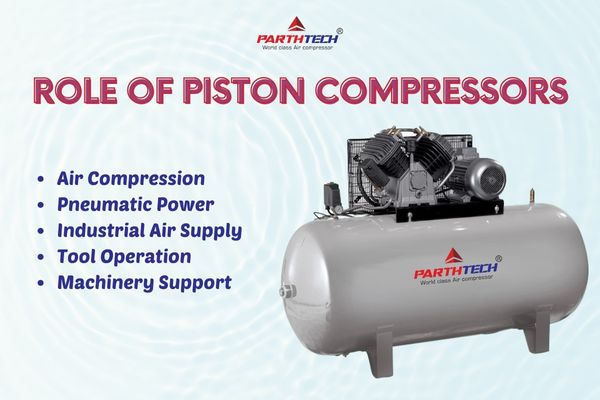-
Call
-
Whatsapp
9825014048
-
Location


Blog


BLOG

The Role of Piston Compressors in Industrial Applications
The Role of Piston Compressors in Industrial Applications
The keys to success in the ever-changing world of industrial operations are dependability and efficiency. Among the myriad tools and machinery contributing to streamlined processes, piston compressors emerge as unsung heroes, quietly powering various sectors with their robust performance.
Understanding Piston Compressors:
Piston or reciprocating compressors operate on a simple yet highly effective principle. They utilize the reciprocating motion of one or more pistons within a cylinder to compress air or gas. Air is drawn in by the piston's downward movement, creating a vacuum. The compressed air is released through an output valve when the piston rises.

Versatility in Applications:
1. Manufacturing and Automotive Industries:
Piston compressors are pivotal in manufacturing and automotive settings, providing air for various processes. From powering pneumatic tools to facilitating precise control in assembly lines, these compressors contribute to the efficiency and accuracy demanded by these industries.
2. Mining Operations:
In the demanding environment of mining operations, where dust and debris are omnipresent, piston compressors prove their mettle. They are utilized for drilling, powering pneumatic machinery, and providing ventilation in confined spaces, ensuring the safety and productivity of mining activities.
3. Oil and Gas Sector:
Robust and weather-resistant equipment is essential to the oil and gas sector. Piston compressors are used in gas gathering, processing, and transportation, providing the compression needed for various gases in this challenging environment.
4. Food and Beverage Production:
In the food and beverage sector, where hygiene is paramount, piston compressors are employed for packaging, bottling, and air-blow cleaning. Their oil-free variants ensure the compressed air meets the industry's stringent purity requirements.
Advantages of Piston Compressors:
1. Cost Effectiveness:
Piston compressors are often more affordable to purchase and maintain than other compressors. This cost-effectiveness makes them attractive for small to medium-sized enterprises seeking reliable compressed air solutions.
2. Durability and Reliability:
The robust design of piston compressors contributes to their durability and reliability. Compared to other compressor types, it has fewer moving parts, piston compressors are known for their longevity and ease of maintenance.
3. Adaptability:
Piston compressors can adapt to changing demands and change their output to meet the application's needs. Their adaptability renders them appropriate for an extensive array of industrial duties.
Conclusion:
Piston compressors may not always take center stage in the grand orchestra of industrial processes, but their importance must be balanced. From manufacturing plants to mining sites, these workhorses silently contribute to diverse industrial applications' efficiency, productivity, and reliability. As technology advances, piston compressors are likely to evolve, maintaining their status as indispensable components in the ever-evolving landscape of industrial machinery.


FAQs

Frequently Ask Questions
A piston compressor, or reciprocating compressor, utilizes the reciprocating motion of one or more pistons within a cylinder to compress air or gas. Air is drawn in by the piston's movement, creating a vacuum. The compressed air is released through an output valve as the piston rises. This compressed air is then used for various industrial applications.
Piston compressors are used in a wide range of industries, including manufacturing, automotive, mining, oil and gas, and food and beverage production. They are chosen for their adaptability, durability, and cost-effectiveness in meeting the compressed air requirements of these sectors.
Piston compressors offer several advantages, including cost-effectiveness, durability, and reliability. Compared to other compressor types, they have fewer moving parts, leading to easier maintenance and longer lifespans. Additionally, their adaptability allows them to cater to varying demands in different industrial processes.
Yes, the choice of a piston compressor depends on factors such as the required air pressure, volume, and the specific needs of the industrial application. Additionally, industries with strict hygiene standards, such as food and beverage production, may opt for oil-free piston compressors to ensure the purity of compressed air.
Piston compressors can be built to maximize energy usage with features like variable-speed drives and effective control systems. By adjusting their output based on actual demand, they contribute to energy efficiency and help reduce operational costs.
Regular maintenance is crucial for ensuring the optimal performance of piston compressors. This includes checking and replacing air filters, monitoring oil levels (for lubricated compressors), inspecting valves and seals, and scheduling routine inspections to address potential issues before they escalate.
